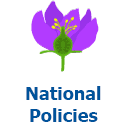 Every country has developed, formulated, and decreed national policies related to rural advisory services. Find some examples here. If you are looking for a national policy from a specific country, please use the search function, selecting the category “National policies” and the tag for the country.
Every country has developed, formulated, and decreed national policies related to rural advisory services. Find some examples here. If you are looking for a national policy from a specific country, please use the search function, selecting the category “National policies” and the tag for the country.
Building an Effective RAS/EAS Model for Smallholders: Emerging Issues and the Four Cornerstones of Sustainability
Rural advisory services/extension and advisory services (RAS/EAS) models are influenced by a number of factors and emerging issues that can determine best practices in the development of extension policy. These emerging issues are extremely valuable in creating RAS/EAS policy and must be considered in the development of innovative extension models. They include: participatory, farmer-led decision-making; privately-led extension and public–private partnerships; gender equality; ICT and mass extension; value chain marketing; and building partnerships.
Four policy cornerstones should also be addressed in efforts to build an effective RAS/ EAS model for sustainable development. These cornerstones include capacity building and technical assistance to support the following extension policy areas: land tenure and information reform; access to credit for smallholders; innovative technical subject matter training, demonstration plots and farmer to farmer extension.
Strengthening the Capacity of RAS Actors for Advocacy and Dialogue on Policy Reform and Action
This article explores possibilities for strengthening the capacity of rural advisory services (RAS) actors to become involved in advocacy and dialogue on policy reform and action. RAS actors include individuals and organisations in the agricultural innovation system that play a role in RAS and/or need to be included in RAS policy dialogue processes. These include governments, research/education institutions, farmers’ organisations, civil society organisations, the private sector, donors, input suppliers and agro-dealers. The article is based on practical experiences from the Food, Agriculture and Natural Resources Policy Analysis Network (FANRPAN) and the Global Forum for Rural Advisory Services (GFRAS).

